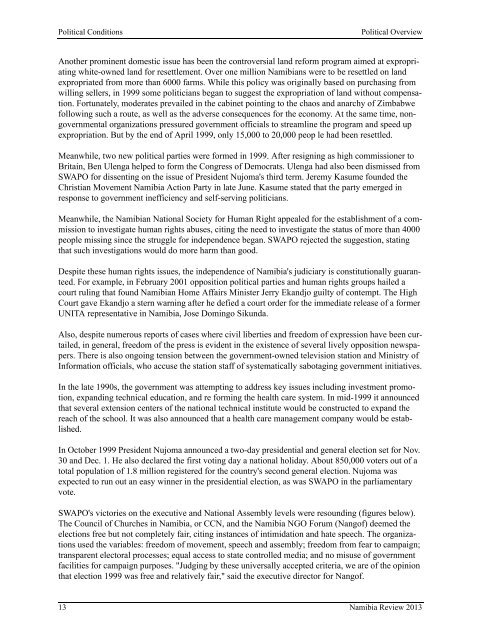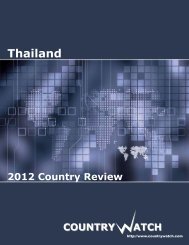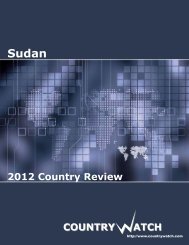Namibia - CountryWatch
Namibia - CountryWatch
Namibia - CountryWatch
You also want an ePaper? Increase the reach of your titles
YUMPU automatically turns print PDFs into web optimized ePapers that Google loves.
Political Conditions Political Overview<br />
Another prominent domestic issue has been the controversial land reform program aimed at expropriating<br />
white-owned land for resettlement. Over one million <strong>Namibia</strong>ns were to be resettled on land<br />
expropriated from more than 6000 farms. While this policy was originally based on purchasing from<br />
willing sellers, in 1999 some politicians began to suggest the expropriation of land without compensation.<br />
Fortunately, moderates prevailed in the cabinet pointing to the chaos and anarchy of Zimbabwe<br />
following such a route, as well as the adverse consequences for the economy. At the same time, nongovernmental<br />
organizations pressured government officials to streamline the program and speed up<br />
expropriation. But by the end of April 1999, only 15,000 to 20,000 peop le had been resettled.<br />
Meanwhile, two new political parties were formed in 1999. After resigning as high commissioner to<br />
Britain, Ben Ulenga helped to form the Congress of Democrats. Ulenga had also been dismissed from<br />
SWAPO for dissenting on the issue of President Nujoma's third term. Jeremy Kasume founded the<br />
Christian Movement <strong>Namibia</strong> Action Party in late June. Kasume stated that the party emerged in<br />
response to government inefficiency and self-serving politicians.<br />
Meanwhile, the <strong>Namibia</strong>n National Society for Human Right appealed for the establishment of a commission<br />
to investigate human rights abuses, citing the need to investigate the status of more than 4000<br />
people missing since the struggle for independence began. SWAPO rejected the suggestion, stating<br />
that such investigations would do more harm than good.<br />
Despite these human rights issues, the independence of <strong>Namibia</strong>'s judiciary is constitutionally guaranteed.<br />
For example, in February 2001 opposition political parties and human rights groups hailed a<br />
court ruling that found <strong>Namibia</strong>n Home Affairs Minister Jerry Ekandjo guilty of contempt. The High<br />
Court gave Ekandjo a stern warning after he defied a court order for the immediate release of a former<br />
UNITA representative in <strong>Namibia</strong>, Jose Domingo Sikunda.<br />
Also, despite numerous reports of cases where civil liberties and freedom of expression have been curtailed,<br />
in general, freedom of the press is evident in the existence of several lively opposition newspapers.<br />
There is also ongoing tension between the government-owned television station and Ministry of<br />
Information officials, who accuse the station staff of systematically sabotaging government initiatives.<br />
In the late 1990s, the government was attempting to address key issues including investment promotion,<br />
expanding technical education, and re forming the health care system. In mid-1999 it announced<br />
that several extension centers of the national technical institute would be constructed to expand the<br />
reach of the school. It was also announced that a health care management company would be established.<br />
In October 1999 President Nujoma announced a two-day presidential and general election set for Nov.<br />
30 and Dec. 1. He also declared the first voting day a national holiday. About 850,000 voters out of a<br />
total population of 1.8 million registered for the country's second general election. Nujoma was<br />
expected to run out an easy winner in the presidential election, as was SWAPO in the parliamentary<br />
vote.<br />
SWAPO's victories on the executive and National Assembly levels were resounding (figures below).<br />
The Council of Churches in <strong>Namibia</strong>, or CCN, and the <strong>Namibia</strong> NGO Forum (Nangof) deemed the<br />
elections free but not completely fair, citing instances of intimidation and hate speech. The organizations<br />
used the variables: freedom of movement, speech and assembly; freedom from fear to campaign;<br />
transparent electoral processes; equal access to state controlled media; and no misuse of government<br />
facilities for campaign purposes. "Judging by these universally accepted criteria, we are of the opinion<br />
that election 1999 was free and relatively fair," said the executive director for Nangof.<br />
13 <strong>Namibia</strong> Review 2013




